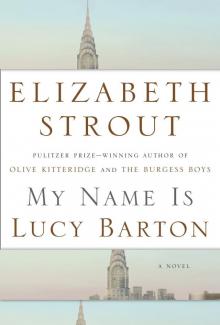- Home
- Elizabeth Strout
Olive, Again Page 10
Olive, Again Read online
Page 10
The next day’s newspaper confirmed the part about the drug users. An arrest had been made. Two people who were drug addicts, and who had assumed the place was vacant, had broken into the house to steal things—to steal copper—and then the fire had started as a result of their cooking meth. They had both made it out of the burning house, but by the time the fire was reported, at four in the morning, there was not much the firemen could do. The place was big, but it was wooden and old, and it went like kindling. Now it sat, the charred remains, right there as you drove into the town of Crosby, Maine, and it was really a sad thing to look at.
It was autumn and the leaves had changed but were not yet falling, and the maples by the Larkin home screamed out their beautiful colors, but to be honest the place had been sad to look at for a while even before it burned almost to the ground. The grass had grown knee-high, and the bushes were no longer trimmed, covering the large, majestic windows in the front. It was no surprise that people were surprised to hear that Roger Larkin had been living upstairs there all along. But what a terrible way to die! Burned to death while two drug addicts cooked their awful stuff right below you. There was a lot of talk, naturally. The Larkins had always thought they were better than others; their son was in prison for that terrible crime; Louise had been a pretty woman, this was acknowledged by the townspeople, she had been a guidance counselor in the high school here—but she had never been right since her son stabbed that woman twenty-nine times. Where was the daughter? Nobody knew.
* * *
—
Jack and Olive were driving out of town, and as they went past the burned-down Larkin place, Olive said, looking out the car window, “Sad, sad, sad.” Then she craned her neck a bit and said, “Oh, someone’s parked out there. Behind the tree. Whose is that?”
* * *
—
The car belonged to the Larkin daughter.
Suzanne had driven up from Boston the evening before, staying at the Comfort Inn on the outskirts of Crosby, making the reservation under her husband’s name. This morning she had gone to the house—what remained of it—and called the only person in town she knew anymore, who in fact was the person who had called her to tell her about the situation when it happened, and this was her father’s lawyer, Bernie Green. He said he would come pick her up; she couldn’t remember how to get to his house.
Help me help me help me help me. Suzanne had been thinking this since she had seen the ghastly ruins of the house in the daylight this morning. Only one corner of the house remained, the rest was a pile of dark rubble and broken glass and blackened planks. A covering of low clouds swept over the sky, almost quilted in appearance. Sitting in her car, her knees bouncing, she picked at the skin near her fingernails; through the windshield she could see that the trunk of the maple tree had been charred as well. Help me help me help me.
As Bernie pulled into the driveway, his tires rolling over the patches of black ash, Suzanne had a sensation of floating toward his car; she had known this man since she was a child. Tall, slightly overweight, he got out and opened the door on the passenger’s side, and she got in, whispering, “Bernie,” while he said, “Hello, Suzanne.” They drove to his house in silence; a shyness had come over her.
“You look like your mother used to,” said Bernie once he was standing in his office on the second floor of his house on River Road. “Have a seat, Suzanne.” He gestured toward the chair with the red velvet seat cushion. Suzanne sat. “Take your coat?” Bernie asked, and Suzanne shook her head.
“How is your mother? Does she know?” Bernie sat down heavily in his chair behind the desk.
Suzanne sat with the back of her hand to her mouth, then she leaned forward and said, “She’s really gone, Bernie. Last night when I said I was her daughter, she told me her daughter had died.”
Bernie just looked at her, his lids partway down. After a minute he asked, “How’s your work, Suzanne? Are you still in the AG’s office?”
“Yeah, yeah, work is good. That part is good,” Suzanne answered, sitting back. A tiny part of her relaxed.
“What division?”
“Child protection,” Suzanne said, and Bernie nodded.
Suzanne said, “It kills me, the job. I have a case right now—” Suzanne waved a hand briefly. “Never mind. It’s always like that, but I love it, my job.”
Bernie watched her.
After a few moments Suzanne said, “You know, I don’t think my father ever thought I was a real lawyer. You know.”
“You are a real lawyer, Suzanne.”
“Oh, I know, I know. But for him, you know, Mr. Investment Banker, something like working in the attorney general’s office, in child protection especially—I don’t know. But he was proud of me. I guess.” She looked at Bernie; he was looking down now.
“I am sure he was, Suzanne.”
“But did he ever say that to you? That he was proud of me?” Suzanne asked.
“Oh, Suzanne,” said Bernie, raising his tired eyes. “I know he was proud of you.”
Suzanne glanced over at the far window, with its long white drapes and a red valance at the top; the clouds could be seen through the drapes’ opening, spreading themselves out above the river. Suzanne looked back at Bernie. “Bernie, can I tell you something?” Bernie’s eyebrows rose slightly in encouragement. “When I was a little girl I used to have this stuffed dog called Snuggles. And I loved Snuggles, he was so soft. And when I came up here two years ago to help my father put my mother in that home, I found out— Well, I didn’t even know Snuggles still existed, but my mother had become attached to it. And she was asleep when I got there last night and she was just clinging to Snuggles, and the people there—the aides—told me she loves that dog, sleeps with it, never lets it out of her sight.” Suzanne bit the inside of her mouth, pushing her cheek with a finger.
Bernie said, “Oh, Suzanne,” and let out a big sigh.
Suzanne’s stomach growled; her head felt a little swimmy. She had had nothing except a cup of coffee early this morning, but she was vaguely glad to have the chattiness rise within her. Glancing about, she saw that Bernie’s office was smaller than she had remembered; there was that gorgeous view of the river, which she did seem to remember. In the corner was a tall clock that was not working. Suzanne crossed her legs, kicking her foot slightly; her brown suede boot bumped against the desk. “My mother—” Suzanne paused. “I don’t know if you know this—she had a little drinking problem. Honestly, I think she was always a little crazy. I think Doyle got her genes, that’s what I think.”
“And how is Doyle?” Bernie asked this impassively, his hands in his lap.
“Well, he’s medicated.” Suzanne had to wait a moment before she could continue; her brother’s story was carved into her deeply; it sat quietly tucked deep beneath her ribcage all the time. “So he’s okay, but he’s a little bit of a zombie. Which is not bad, since he’ll be there for the rest of his life. Before they got him doped up, he just cried all day long. All day long that poor boy wept.”
“Oy vey,” said Bernie. He shook his head, and Suzanne felt a sudden deep deep affection for this man she had known from such a young age. She saw that his eyes were blue, they were large eyes, watery with age. “Let’s get back to your mother for just a minute, Suzanne. So she didn’t know who you were yesterday? And she has no idea about the fire? She has no idea your father died? Does she know anything about Doyle anymore?”
Suzanne sat back, her foot kicking into the air, and said, “No, I don’t think she has any idea about my father, and honestly?” Suzanne looked at this man across from her. “I didn’t tell her.”
“I understand,” said Bernie. “What would be the point?”
“Well, exactly,” said Suzanne. “What would be the point? My father said that when he went to visit her, she’d get really abusive—” Suzanne passed a hand through the air. “Oh, who kno
ws. Anyway. She didn’t mention Doyle, so I didn’t either.”
“No.” Bernie shook his head, kindly. “No, no, of course not.”
* * *
—
This is what Suzanne did not tell Bernie: that two years ago, on an instinct, she had driven up to visit her parents spontaneously, and when she had stepped up to the door of the house, she heard screaming inside. She had taken her key and let herself in, and in the living room her father was standing over her mother, who was sitting in a chair in a dirty nightgown, and her father was holding her mother by the wrists, lifting her and shoving her back down into the chair, lifting and shoving and yelling at her, “I can’t do this anymore, goddammit, I hate you!” And her mother was screaming and trying to get away, but Suzanne’s father kept her wrists in his hands. When her father turned and saw Suzanne, he sank down on the floor by the chair and began to weep, hard. Suzanne had never seen her father weep before, it had been unimaginable to her that he could. Her mother kept screaming from where she sat in the chair.
“Suzanne,” her father said, his face wet, his chest heaving, “Suzanne, I can’t do it anymore.”
“Oh, Daddy,” Suzanne said. “She’s been getting so much worse, you shouldn’t have to take care of her alone.” Suzanne had finally gotten her mother to bed, but she had seen the bruises on her mother’s wrists, and she had been shocked to find more bruises on her mother’s ankles, on her upper arms too, even at the top of her chest. Her father had stayed on the living-room floor, and she sat down beside him; his red T-shirt was wet. “Dad,” she said. “Dad, she’s got bruises all over her.” Her father said nothing, just hung his head in his hands.
She had hired round-the-clock aides to come in, meeting with each one, telling them that her mother had fallen, but she had been scared—scared to death—that they would say something to the authorities, although they never did. But in one week’s time there was a sudden opening at the Golden Bridge Rest Home, and Suzanne helped her father move her mother in, and Suzanne’s father retreated to the upstairs, where he had been living for a while. Her father had said to Suzanne, “Please don’t come back here again, you have your life, and you must live it.” He had become a shell of a man, not even recognizable to her.
Suzanne thought now that she—Suzanne—had not been quite right in the head since this had happened.
* * *
—
She said, “So every week, you know, I spoke on the phone with my father.”
Bernie scratched the back of his head. “Tell me,” he said.
“Every week I called him. Even if it was only for a few minutes. I mean, what did the man have to say? But we would chat, and I spoke to him the night he died. I mean, before he died, of course,” and Suzanne’s saying that made her think: Oh, I’m really not right in the head. She said, “I think I’m not right in my head. Not like my mother being crazy, just everything—”
Bernie raised his large hand. “I know what you’re saying. You’re fine. You’re under stress. You’re not crazy, Suzanne. Of course you feel you’re not right in your head.”
Oh, she loved him, this man.
Suzanne closed her eyes briefly. “Thank you,” she said. And then she started to cry. She wanted to wail her head off, but her weeping came out only in little fits and starts. It was like waiting to throw up, she thought—how you could sense it but it wasn’t here yet. She was surprised that he had a box of tissues—she hadn’t noticed them—sitting right on his large wooden desk. He pushed them forward to her, and she pressed a tissue to her eyes. After a moment she said, “So you have people in here all ready to cry, like therapists do?” She tried to smile at him. “I mean, you’re all set with the Kleenex box.”
“People come here in various states of distress,” Bernie said, and she realized of course that would be true.
“Well, I’m distressed,” she said. She blew her nose, and scrunched the tissue up in her hand. Her crying went no further.
“Of course you’re distressed. Your father, to whom you spoke each week on the telephone, has died horribly in a fire. I would think you’d be quite distressed, Suzanne.”
“Oh, I am. I am. And also, I might be getting divorced.”
At this news, Bernie’s eyelids dropped all the way down, and he shook his head in what Suzanne thought was great sympathy. After a moment he looked up and asked, “Your sons?”
Suzanne noticed a small wastebasket under the desk, and she bent down and tossed her tissue into it. “Well, they both started college last year. One at Dartmouth, the other at Michigan. They have no idea we might be separating, thank God. But it’s just— Oh, it’s all awful.”
Bernie nodded.
Suzanne said, “It’s my fault, Bernie.” She hesitated and then said the words: “I had an affair. A stupid, stupid little affair with a—oh, a kind of creepy man—and when I tell my husband I know he’ll completely flip out and he’ll want a divorce.” She added, “My husband is really—” She paused, looking for the right word. “Well, he’s traditional.”
Bernie moved a piece of paper on his desk just slightly with his hand, and then finally he nodded one small nod.
“Why do you act like this is so normal?” Suzanne squeezed her nose with her fingers.
Bernie let out a sigh and said, “Because it is, Suzanne.”
“Oh, man, not for me, it isn’t. I feel like I’ve set off a bomb in my life. For years I felt like I was safe on an— I don’t know, like an island. I had floated away from all those troubles that poor Doyle had, I was safe on my island with my own family, my husband and my boys, and now I’ve blown it up.”
“Loss can do this,” Bernie said.
“Do what?” Suzanne asked.
Bernie opened his hands upward. “Cause these…indiscretions.”
“But when I had this crappy indiscretion, my father wasn’t dead yet.”
“But your sons have left you.” Bernie pointed a finger toward the ceiling. He added, “And six years ago your brother was sent to prison for life. And, as you put it, your mother is gone. Those are huge losses, Suzanne.”
These words rolled over Suzanne with a swiftness, as though something true had been said but she couldn’t catch it. She gazed around his office. Oh, she wanted to stay here! A sudden crack of sunlight came through the far window, making a small strip of light across Bernie’s desk, and she saw that on his desk was one small framed photograph, facing him. “Who’s that?” she asked, nodding toward the frame.
He turned it around so she could see. The couple, in black-and-white, looked like they were from the olden days; the man had a full beard and a suit with a skinny tie, and the woman had a hat tight on her head. “My parents,” he said.
“Really.” Suzanne squinted at them. “Were they, you know, Orthodox?”
Bernie held up a hand and turned it one way, then another. “Yes, no. Eventually no.”
“Eventually? I thought if you were Orthodox, you were Orthodox.”
Bernie pressed his lips together, then gave a shrug. “Well. You were wrong. They died in the camps,” Bernie said. “They pretended they were not Jews, but they were and so they died.”
“Oh Jesus. Oh God. I’m so sorry.” Suzanne’s face got very hot. “I had no idea,” she said.
“Why would you have any idea?” He looked at her with his eyelids half down.
“How did you end up in Maine, Bernie?”
Bernie seemed indifferent to the question. “My wife and I wanted to get away from New York, and there was—still is—a Jewish community in Shirley Falls, so we came up here, but then we got tired of it, the community, so we moved to Crosby.”
She wanted to ask him how he’d come to New York after his parents had died in Europe, but she did not ask. She wanted also to ask about his faith. She wondered if he had lost his faith, if that’s what he meant by being t
ired of the community. It would be natural—wouldn’t it?—to lose your faith if you lost your parents in such a way? For many years Suzanne had had what she thought of—privately—as a faith of sorts, but this sensation had eluded her for a few years now, and she felt very bad about that. “Oh, Bernie,” she said. Then she asked, “How are your kids? Grandchildren?”
“They’re all fine.” He looked out the window then, and after a moment he said, “Ironically, they’re all living back in New York. Which is fine,” he added.
“Okay,” Suzanne said. She did not ask about Bernie’s wife, because Suzanne had just seen his wife—they had said hello—on her way upstairs to this office. His wife looked like a melted candle, this was what had gone through Suzanne’s mind. But she may have always looked like that, Suzanne could not remember.
“I wish I could stay right here,” Suzanne said. Across the room was a sofa in the corner that matched the red velvet cushioned chair she sat on.
Bernie said, “In Crosby?”
“Oh God, no. No, I meant here. Right here in this room. I wish I could just stay here, is what I’m saying.”
“Stay here as long as you like, Suzanne. There’s no rush.”
But they spoke then about the estate. When Bernie told her the amount of money that would come to her, Suzanne sat up straight. “Stop it,” she said. “Bernie, that’s sickening.”
“Your father made very good investments,” Bernie said.
She asked, “What did he invest in? I know he was an investment banker, but what did he invest in that made all this money? My God, Bernie, that’s a lot of money.”
“South Africa,” Bernie said, glancing at some sheets of paper in front of him. “Way back. And also the pharmaceutical companies. Exxon, too.”

 The Best American Short Stories 2013
The Best American Short Stories 2013 Abide With Me
Abide With Me My Name Is Lucy Barton
My Name Is Lucy Barton Olive Kitteridge
Olive Kitteridge Anything Is Possible
Anything Is Possible Olive, Again (ARC)
Olive, Again (ARC) Olive, Again
Olive, Again